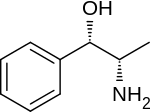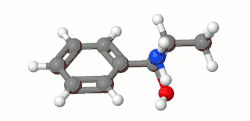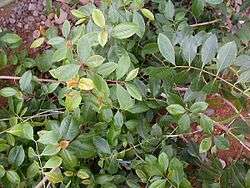Cathine
Cathine, also known as D-norpseudoephedrine and (+)-norpseudoephedrine, is a psychoactive drug of the phenethylamine and amphetamine chemical classes which acts as a stimulant. Along with cathinone, it is found naturally in Catha edulis (khat), and contributes to its overall effects.[2] It has approximately 10–14% the potency of amphetamine.[2]
 | |
 | |
| Clinical data | |
|---|---|
| Routes of administration | Oral |
| ATC code | |
| Legal status | |
| Legal status |
|
| Pharmacokinetic data | |
| Elimination half-life | 1.8–8.6 hours[1] |
| Identifiers | |
IUPAC name
| |
| CAS Number | |
| PubChem CID | |
| DrugBank | |
| ChemSpider | |
| UNII | |
| ChEMBL | |
| ECHA InfoCard | 100.007.050 |
| Chemical and physical data | |
| Formula | C9H13NO |
| Molar mass | 151.206 g/mol g·mol−1 |
| 3D model (JSmol) | |
SMILES
| |
InChI
| |
| | |
Pharmacology
Like amphetamines, cathinone, and ephedrine, cathine acts as a norepinephrine releasing agent (NRA).[2] It also acts as a dopamine releasing agent (DRA) to a lesser extent.[2]
Chemistry
Cathine is one of the four stereoisomers of phenylpropanolamine (PPA).
Regulation
The World Anti-Doping Agency's list of prohibited substances (used for the Olympic Games among other athletic events) bars cathine in concentrations of over 5 micrograms per milliliter in urine. Cathine is a Schedule III drug under the Convention on Psychotropic Substances.[3] In the United States, it is classified as a Schedule IV controlled substance.[4]
In Australia, Cathine is officially a schedule 4 drug but is not available or approved for any use.

In Hong Kong, cathine is regulated under Schedule 1 of Hong Kong's Chapter 134 Dangerous Drugs Ordinance. Unlawful possession is punishable by severe fines and imprisonment.
See also
- L-Norpseudoephedrine, the enantiomer
- Methcathinone
- Ephedra sinica ("Ephedra")
- Ephedrine
- Pseudoephedrine
- Methamphetamine
References
- Toennes, S. W.; Harder, S.; Schramm, M.; Niess, C.; Kauert, G. F. (2003). "Pharmacokinetics of cathinone, cathine and norephedrine after the chewing of khat leaves". British Journal of Clinical Pharmacology. 56 (1): 125–130. doi:10.1046/j.1365-2125.2003.01834.x. PMC 1884326. PMID 12848785.
- Hoffman, R.; Al-Absi, M. (December 2010). "Khat use and neurobehavioral functions: suggestions for future studies". Journal of Ethnopharmacology. 132 (3): 554–63. doi:10.1016/j.jep.2010.05.033. PMC 2976806. PMID 20553832.
- "List of psychotropic substances under international control" (PDF). International Narcotics Control Board. Archived from the original (PDF) on 2012-08-31.
- https://www.deadiversion.usdoj.gov/schedules/orangebook/a_sched_alpha.pdf